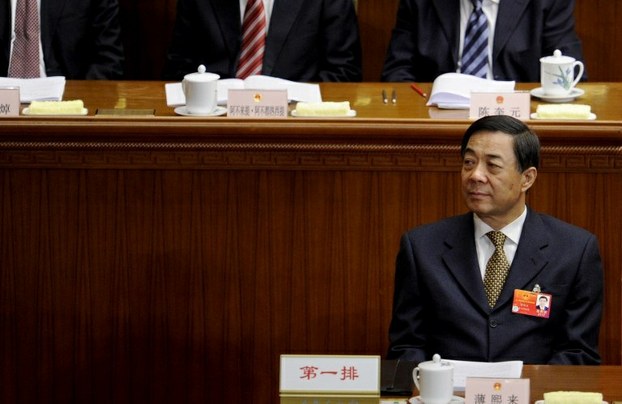




Disgraced Chinese politician Bo Xilai has agreed to plead guilty to corruption charges that may be confined to an earlier stage of his career in an apparent bid to limit political fallout from China's biggest political scandal in decades, according to reports this week.
The trial could be held within weeks, the reports said, six days after Beijing indicted the 64-year-old former Chongqing ruling Chinese Communist Party chief and Politburo member for corruption, embezzlement, and abuse of power.
Pending the trial, the authorities are clamping down on the flow of information on the case, Chinese journalists say.
“They [authorities] perhaps don’t want people to discuss and comment on Bo Xilai’s case prior to the trial except to get the information only from the People’s Daily [the Communist Party organ] and Xinhua [the state news agency]," Gao Yu, a Beijing-based veteran journalist, told RFA's Mandarin Service.
"We won’t even see any comments from any other websites until they officially announce the trial date. The control is so tight—there is even no exception for Weibo [microblogs]."
Guilty plea
But Reuters news agency, citing three sources, reported Wednesday that Bo has agreed to plead guilty in an apparent bid to earn a more lenient sentence, although it was not clear if he would plead guilty to all or only some of the charges.
"Bo Xilai had initially refused to admit guilt and insisted on defending himself," said a source with ties to the leadership and direct knowledge of the matter, requesting anonymity due to the political sensitivity of the case.
It was reported in February that Bo had refused to cooperate with government investigators, staged a hunger strike twice, and refused to shave his beard in protest against what he deemed unfair treatment.
"But in a change of heart, he cooperated and will plead guilty [at his trial] in the hope that he will receive a relatively lenient sentence," the source told Reuters.
In China, defendants are presumed guilty until proven innocent, and those who refuse to cooperate are often given harsher sentences.
Abuse of power
Other sources indicated to Reuters that Bo may not plead guilty to the abuse of power charge believed to be linked to the murder of British businessman Neil Heywood by Bo's wife, Gu Kailai, when Bo was Chongqing party chief.
Gu was convicted of the murder last August, and Bo's police chief, Wang Lijun, was jailed for trying to cover up the crime.
According to a report Tuesday from the respected current affairs magazine Caijing, the 25 million yuan (U.S. $4.1 million) corruption charges against Bo stem from his time running the smaller city of Dalian in the 1990s, not Chongqing.
Caijing did not cite a source but said, based on Chinese law, the earliest date that the trial could start would be early August.
Given the length of his career and the high positions he reached, it seems implausible that corruption would have affected only Bo's earlier, less-powerful posts, Agence France-Presse quoted analysts as saying.
"When he was in Dalian he was able to take 25 million. Could he possibly have stopped?" asked China politics expert Steve Tsang of the University of Nottingham, calling the concept "just not logical."
But minimizing the scope of charges avoided implicating others, exposing too much high-level corruption, or requiring a tougher sentence, he added.
"They want to make sure the Bo Xilai case can be managed in a way that is least damaging to the party," Tsang told AFP.
Analysts say determining how to handle Bo's trial would have required tough negotiations among the political elite, which can effectively dictate judicial proceedings.
From Dalian, a city of 7 million people, Bo went on to run the national Ministry of Commerce and then the Chongqing metropolis, with a population of 30 million.
'Power struggle'
A third source, also with ties to China's leadership, told Reuters that Bo will plead guilty to accepting bribes and corruption while he was mayor and Communist Party boss of Dalian between 1992 and 2000.
But Bo will deny the charge of abuse of power when he was party boss of Chongqing, the source added.
"By pleading not guilty to the abuse of power charge, Bo wants to show that he is a victim of a power struggle," the source told Reuters, also requesting anonymity. The source did not elaborate.
In a separate development, Bo Xilai's son Bo Guagua, 25, who is in the U.S., is reported to be unlikely to return to his homeland for his father's trial, reports said.
He has enrolled at Columbia Law School in New York, one of America’s most respected law schools, after completing a master’s at Harvard’s Kennedy School of Government last year, the reports said.
Some reports suggested that Bo Xilai may have struck a deal with Chinese prosecutors in order to protect his son.
“If the old man doesn’t accept his crimes, they’ll go after his son,” Hu Ping, a New York-based exile and political commentator, wrote in the Los Angeles Times.
“I think it is credible to believe that Bo Guagua has been taken as a 'hostage' by Chinese authorities," Hu Ping told RFA.
"People are further convinced when they see reports that Bo Guagua was accepted by the Law School of Columbia University," he said.
"Chinese authorities must have something to control Bo Xilai just in case he overturns his confession during the court trial. Therefore, Bo Guagua could be used as a hostage to make Bo Xilai plead guilty."
Reported by RFA's Mandarin Service. Translated by Feng Xiaoming. Written in English by Parameswaran Ponnudurai.